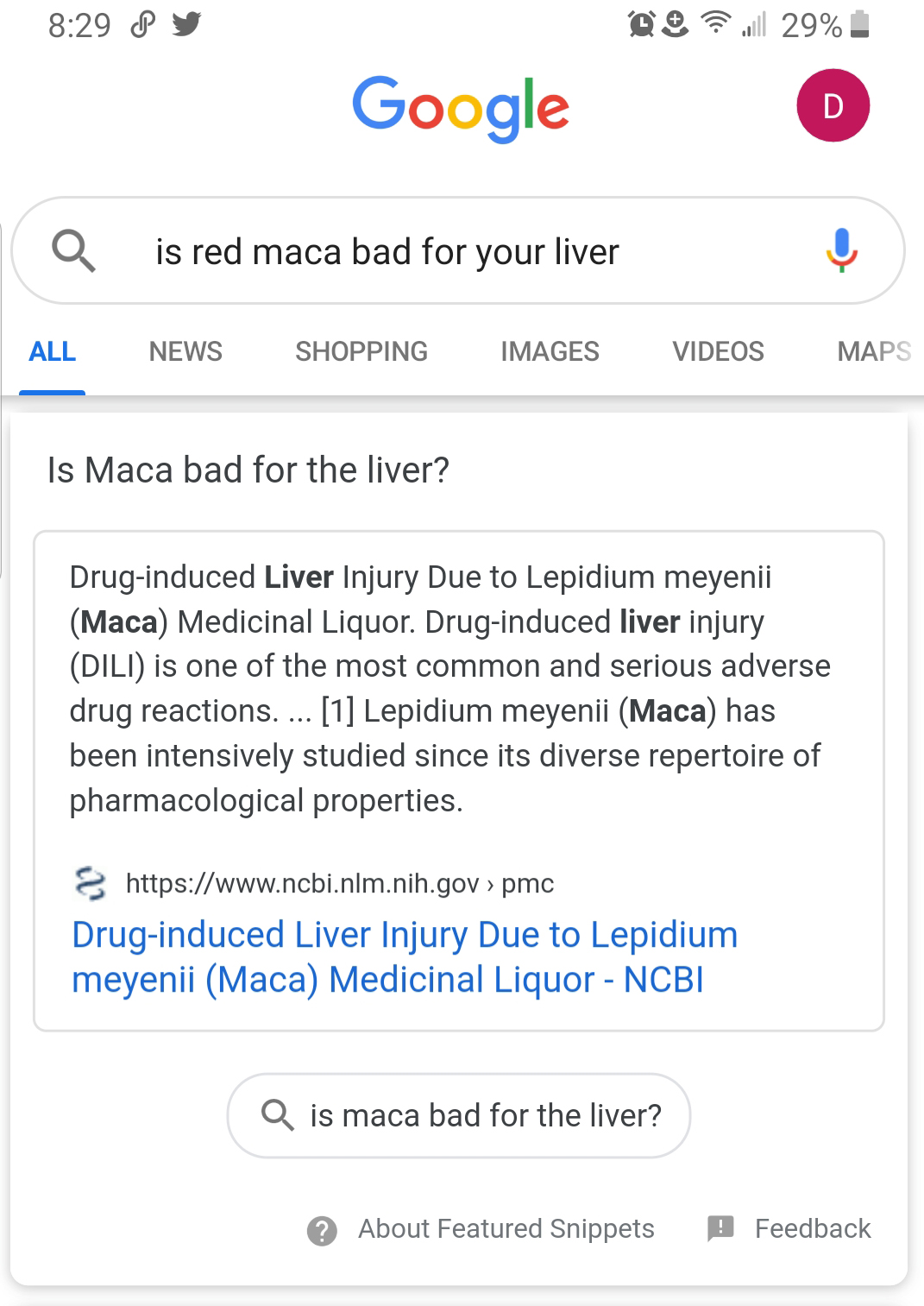Is Maca Bad For The Liver?
Introduction
There is no doubt that the liver is one of the most crucial organs in the body. And it simply makes good sense to keep our livers as healthy as possible. Maintaining a fully functioning liver involves eating a balanced diet, staying active, staying at a healthy weight, limiting alcohol consumption and avoiding toxins (1). These are especially important for anyone with compromised liver function.

As more and more people consider their liver health, we’ve been seeing more questions about the effect that maca has on the liver. In this article we will review the research as well as clarify a commonly misinterpreted article on the subject.
Research on Maca’s Effect on The Liver
Maca (lepidium meyenni) has gained in popularity over the past 20 years and stimulated a significant amount of research. One of the most important areas of research involves maca’s safety as a food source. To date there are 100s of published studies regarding maca’s effect on important systems in the body. The results of these studies have been positive and maca is regarded as safe for both humans and animals by all researchers and authorities.
In terms of studies done on maca and the liver there have been about 15 directly related to the topic (2)
None of these studies contain any reference to maca being harmful to liver function in any way. And some even suggest that maca may be helpful to the liver. One study in particular concluded that maca may “lighten the inflammation produced in the body by alcohol” (3)
To be sure, more research is needed before making any general or sweeping conclusions, but it is telling that these studies have shown maca in a positive light when it comes to liver health.
Clarifying A Study That Shows Up in Google
Now, if you got here by searching “Is Maca Bad For The Liver?” on Google, you’ll likely have seen an article with a very scary sounding title: “Drug-induced Liver Injury Due to Lepidium meyenii (Maca) Medicinal Liquor.” (4)

Before pushing the panic button based on that title, let’s dive in and see what this article actually says and what it concludes.
At the beginning of the article, the authors point out that maca is considered as safe and has shown no evidence of being toxic to the liver:
“Maca has been intensively studied since its diverse repertoire of pharmacological properties. These experimental studies have not found any evidence of in vivo or in vitro toxicity associated with either long- or short-term consumption.”
Based on this preponderance of research, the authors were surprised to find the case they reference in their article. In this case, a person in China went to the hospital reporting stomach upset, regurgitation and excessive burping after having consumed 300ml of maca extract in an alcohol solution. Doctors were able to help the person quickly, but noted that a full liver recovery took longer than expected.
The authors of the article postulate that maca could have been responsible for the patient’s adverse reaction, and suggest that further research is necessary.
But let’s look at the facts of this case a bit more carefully. 
In essence, what we have is an extreme case with several important factors. First of all, the person drank a huge amount of maca extract – 300ml is equivalent to 10 ounces and is well over 20 times the amount recommended to consume at any one time. Second, the extract was alcohol based, which means that the person drank 10 ounces of alcohol. Finally, the maca in question was grown in China and was likely of inferior quality. See our article on Chinese grown maca here.
While we can agree with the authors of this article that more research is advisable, in no way is this one case representative of the millions of people who consume maca safely every year. When taken in recommended quantities and in proper preparations (powder, capsule and glycerin extracts), high quality maca has to date shown no risk factor for liver health.
Further Questions regarding maca root consumption and liver health
Is maca root safe for liver health?
Maca root is generally consider safe for liver health, but it is important to check with your doctor if you have any particular concerns before adding it to your diet.
Can maca root help in liver detoxification?
No studies are available at this time regarding maca's potential role in liver detoxfication.
What are the potential side effects of maca root on the liver?
When taken in recommended amounts there are no known side effects from maca consumption.
Is maca root beneficial for fatty liver disease?
To date there is no research that links the consumption of maca to support for fatty liver disease.
Are there any studies linking maca root to liver toxicity?
There is one study that makes a link, as pointed out above. This study is not comprehensive and has not been followed up. It's likely that the toxicity was due more to the alcohol involved in this particular case, than to the actual maca root consumed.
What are the effects of maca root on liver function?
Some medical studies have found maca root to be beneficial to the liver in various ways.
Maca root reduced oxidative stress and liver toxicity according to a study published in 2022
Another study from 2024 confirmed that maca helped protect the liver from toxicity.
Supplementation with maca may also help the liver recover from exposure to alcohol.
Maca root has also been shown to reduce inflammation in cases of acute hepatitis.
While this research is encouraging, more studies are necessary to make any definitive conclusions regarding maca root's benefits for liver health.
Are there any contraindications for using maca root with liver medications?
There are no known contraindications for consuming maca root with liver medications. However, it's important to consult with a knowledgeable health care professional if you have any concerns about combining maca with any type of medications.
Which maca is best for liver health?
In general we recommend our tri-color gelatinzied maca root powder and capsules for anyone taking maca root with the aim of support liver health. The reason is that gelatinized maca is pre-cooked and easier to digest. Also tri-color maca products have all the major maca root colors and thereby offer broader benefits.
Conclusion
Does all this research mean you should take maca without concerns? If you are healthy, we would say probably yes. If, however, you do have a pre-existing liver condition or other serious health condition it’s important to check with your physician before adding anything new to your diet including maca.
We hope that this article has been helpful and has shed some light on the state of research regarding maca and liver health. If you have any further questions please reach out to us. We’re always happy to help.
Enjoy the day!
![]()
